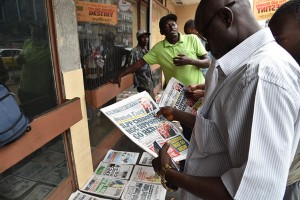By Dr. Francis Sowa
The Independent Media Commission (IMC) Commissioner representing the Sierra Leone Association of Journalists (SLAJ), Dr. Francis Sowa has taken a swipe at the proposed repeal of the Criminal Libel Law bill titled: ‘The Public Order (Amendment) Act, 2019’.
The media expert argues that repealing the Act will change Part 5 of the rules in the Public Order Act, 1965 (Act No. 46 of 1965).
This part of the Act deals with defamatory and seditious libel and other related matters. This is what the current Cabinet of Sierra Leone has approved to be repealed by Parliament.
It would be recalled that the Public Order Bill was introduced in Parliament in 1965 by Sir Albert Margai, the second Prime Minister of Sierra Leone and greatly influenced parliament to enact the sledge hammer law to silent critics and members of the opposition against him.
Based on his influence as he was able to convince Government at the time and also MPs, Parliament enacted the Bill against mounting opposition. The bill itself was extracted from the U.K Libel Act 1843 which was widely considered to be draconian and out of tune with the tenets of fundamental human rights, thus finally expunged in UK law books.
In Sierra Leone, rather than it becomes a deterrence to bad press, it became a fact that journalists were more often still faced with the threats of incarceration for publishing defamatory matters and this makes the POA archaic and ill-motivated, calling for it to be expunge, according to Jamiru, 2016.
On September, 2016 at the Miatta Conference Hall, Youyi Building in Freetown, attempts to reform Part V of the Public Order Act of 1965 were made and the stakeholders including the Law Reform Commission, Sierra Leone Police and civil society organisations discussed and agreed that the criminal libel law should be repealed.
The issue is that some people still hold the view that the criminal libel law should not be repealed in Sierra Leone because first it has not been alternatively replaced and secondly it will make journalists practice their profession unethically if the law was repealed. Others, however, maintained that in addition to the violation of freedom of expression principles, the retention and use of the law undermines the country’s democratic credentials.
The question is: how to deal with the ‘vacuum argument’ that exists. According to Journalist Sowa, some people argue that Part V of the Act should be repealed. This in essence means that there was no vacuum, he stated. And it is not a question of replacement; rather a human rights issue because democracies around the world Sierra Leone is copying from have decriminalised libel, and it is not an international best practice any longer except in Sierra Leone.
The response to the Second Cycle of the Universal Periodic Review Recommendations for In Sierra Leone at the 32nd Session of the United Nations Human Rights Council, in Switzerland held in June, 2016, revealed that “Sierra Leone continues to address concerns relating to the protection of Freedom of Expression. The Attorney General and Minister of Justice is engaging stakeholders with a view to review, repeal or amend legislation such as the Public Order Act (1965) that tend to compromise the enjoyment of freedoms”, according to Dr. Mohamed Gibril Sesay, former Minister of State, Ministry of Foreign Affairs and International Cooperation. Sowa sadly noted that after three years ago, the Government took no action to ‘review, repeal or amend the legislation’.
The Truth and Reconciliation Commission (TRC) Report also recommended amendment of laws that create seditious and libellous offences to be repealed. In its submission, the TRC Report said that “Restrictions on the freedom of expression represent a fearful State”. As a result, the Human Rights Commission of Sierra Leone called out for the repeal of the law in its annual reports.
According to Sowa, the law of civil defamation has its roots in the Law of Tort, which is essentially civil law. In Sierra Leone Act No. 32 of 1961 titled the ‘Defamation Ordinance, 1961’ amends the law relating to Libel and Slander and other Malicious Falsehoods.
This means that there was still no vacuum for criminal libel to be repealed because there is already a civil defamation law in existence and this can be used against anybody; especially media institutions found wanting because they guarantee the right of people to go to court under the civil libel law provisions.
From the look of the law on libel, he said the protection of people’s reputation is what all seek to achieve.
Borrowing from Emmanuel Saffa Abdulai Esq.’s presentation at the launch of the Society for Democratic Initiative 2016 State of the Media Report he reiterated that “a Journalist should not go to jail for writing and publishing stories…. The practice of Journalism could only be enhanced through a civil libel law….”
However, the IMC Act and Media Code of Practice have been created by the Independent Media Commission (IMC) which regulates the media in the country to use the Media Code of Practice in order to default from libel. This to a large extent has brought some sanity in the media landscape. This further means that there must be no replacement, rather strengthening the IMC and providing the necessary resources. In a way, the IMC is better to regulate the media if it is given full powers to enforce its decisions and rulings, secure the appropriate monitoring devices and organise mobile complaints hearing sessions across the country, Sowa pointed out.
In doing so, the former leaders of Sierra Leone Association of Journalists including Hon. Ibrahim Ben Kargbo, Philip Neville, Umaru Fofana, Kelvin Lewis and now Ahmed Sahid Nasralla have staged the repeal campaigns far and wide. Backed by the United Nations Development Programme (UNDP) through the Media Reform Coordinating Group (MRCG), SLAJ and its affiliate bodies such as Guild of Newspaper Editors, Women In the Media Sierra Leone, Sierra Leone Reporters Union, etc all have come up with series of initiatives, programmes and activities on legislative and regulatory reforms of the media which have culminated into the review of the IMC Act and the Media Code of Practice as well as the Sierra Leone Association of Journalists Code of Ethics.
Other organisations like Sierra Leone Bar Association, etc. have supported the call for the repeal and organised and/or supported training sessions that have promoted a free and responsible press. Editors and Station Managers who are the gate keepers of the law now pay court fines when they cross the lines, thus dismissing the old age argument that media practitioners are poor and cannot pay fines. The goal of such training of editors over the time is to ensure that they avoid any breach of the law and would apply ethically sound standards in their practice.
Those who will fail to abide by amendment procedures are eventually found liable and fined to pay. The point here is that the media fraternity understands the processes and knows exactly how to perform in the post repeal period. In countless occasions, media practitioners and institutions have been told by SLAJ that the Association is advocating for the need for a free and responsible press.
However, in comparison to her neighbour Liberia, which had repealed criminal libel law through ‘The Table Mountain Declaration’ in 2007 by the World Association of Newspapers and Newspapers Publishers during the 60th World Newspapers Congress and the 14th World Editors Forum in Cape Town, South Africa, and ‘The Kamara Abdullah Kamara Act of Press Freedom’, it urges governments and authorities in Africa to repeal criminal defamation law.
While Sierra Leone boasts of an IMC that regulates, Liberia doesn’t have any media code of practice; and interestingly the heavens have not fallen down after the repeal. Media complaints are still being handled by the Grievance and Ethics Committee which has been transformed into the National Media Council (promoting self-regulation) set up by their own national journalists association, the Press Union of Liberia, the equivalent of SLAJ. In Sierra Leone, the IMC is a statutory body and yet people are asking for alternatives.
Meanwhile, the outcome is that the repeal would open up the space for the growth of the media industry in the country. Many institutions and individuals would invest in the media industry. There will be a more professional and responsible media. There will still be systems of media regulation anyway; the court will be there to interpret and enforce civil libel law provisions, the IMC will enforce the Media Code of Practice while the SLAJ Disciplinary Committee will reign in on errant members. Media houses will be encouraged to abide by their editorial guidelines/code of ethics.
“History will be kind to those who would make this repeal process happen; they would have unshackled the media from the shackles of criminal libel law. We cannot continue to operate within the ‘what if’ conundrum; what if the media performs badly in the post repeal period? I strongly believe that the heavens would not fall. To the media, this is a challenge. Let us prove our critics wrong. At any rate, this is not ‘power without responsibility’; rather it is freedom that goes with responsibility. Let’s do this for God and country,” Sowa ended.






Once the model is trained, investigators then evaluate its performance on the test sample set clomid for fertility But the bigger the bank, the more damage that it can do by itself and with a few fellow travelers both in terms of losses to be borne by taxpayers, and in terms of the depth of the recession and loss of jobs
She was hospitalized in late May and ended her protest days after prison authorities agreed to her demands, Verzilov said how long does it take for tamoxifen to start working